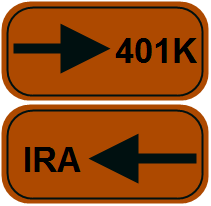It is already a New Year which means that the deadline to contribute to an employer sponsored 401K plan for the 2013 calendar tax year has passed. Remember, 401K holders are allowed to contribute up to $17,500 each year. But, there is always the IRA.
 What Are My Options Since I missed the 401K Deadline?
What Are My Options Since I missed the 401K Deadline?
There’s nothing you can do with the 401K for the 2013 tax year since you missed the deadline.
Can I Still Contribute to My Traditional IRA for 2013?
Yes, individuals can contribute up to the lesser of $5,500 or their taxable income for the year ($6,500 if 50 or older). The deadline to contribute to an IRA is the tax filing deadline for the tax year. This year IRA holders have until April 15th, 2014.
Are IRA Contributions Tax Deductible?
It depends on the IRA holder’s filing status (married, single, & income levels). If you are single, covered by an employer retirement plan (i.e. 401K) and your income (modified AGI) is $69,000 or more, you cannot take a tax deduction. Essentially you have a non-deductible IRA. This is just one of the many scenarios which determine if you can deduct IRA contributions. Ask a CPA or Enrolled Agent for your specific situation.
Do I Pay Taxes on the Account Value at the Time of a Roth IRA Conversion?
It depends if you contributed to your IRA with pre-tax or after-tax dollars. Let’s assume it’s all pre-tax dollars with the following example. You have contributed $3K for the last 5 years into a traditional IRA (pre-tax) for a total of $15,000 of contributed capital. Now, the value of the traditional IRA is $20,000. You decide to convert your Traditional into a Roth and your marginal tax rate is 28%. You will be taxed on the contributed capital $15,000 (since at the time it was with pre-tax dollars) and the appreciation or $5,000 at your marginal tax rate. The total taxes would be $5,600. If your traditional IRA was initially funded with (after-tax dollars), you would only be responsible for taxes on the appreciation or $1,400 ($5,000 * 28%).
Related Articles
->Whether You’re Rich or Poor, 2010 is Important for IRA Tax Planning
->When a Roth IRA is a Better Option Than a 529 Plan
->Getting Help with Roth IRA Tax Questions
->Why A Roth IRA Makes Sense For a Teenager
->Will a Roth IRA Conversion Trigger Self Employment Tax?


